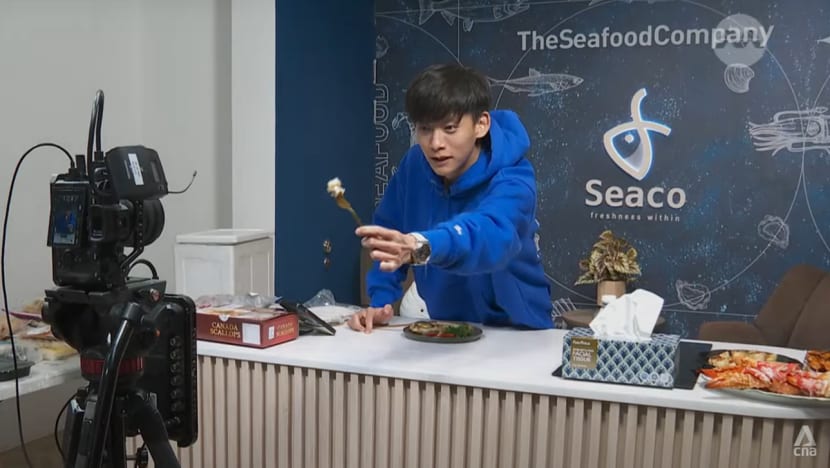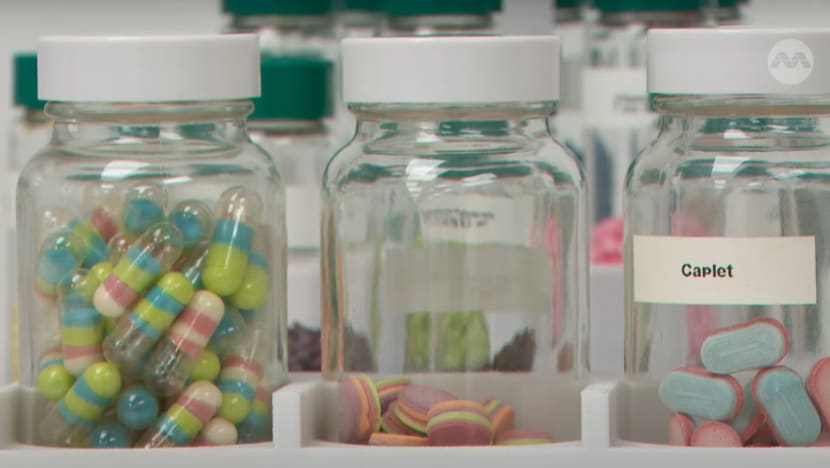Fresh seafood, new medicine tablets: Convergence of tech helps wholesalers sell to consumers directly
Wholesalers in Singapore are tapping new markets while saving on costs.

A TikTok sales livestream by Singapore seafood distributor The Seafood Company.

This audio is generated by an AI tool.
SINGAPORE: Before advancements in cold chain technology, local wholesaler The Seafood Company struggled with boosting the sales it made directly to consumers.
Delivery logistics was a challenge, with the firm incurring high expenses to get its fresh seafood to customers’ doorsteps. But a new revenue stream quickly emerged when it began tapping new technology.
The company, which needs to keep its food cooled to as low as -18 degrees Celsius, can now ship its products in temperature-controlled delivery vans.
The firm also turned to short video app TikTok to reach more people, increasing its sales by 10 per cent.
The Seafood Company’s managing director Kenneth Chia told CNA that it now “dares to offer” seafood of a higher quality to customers.
“In the past, even when we are processing sashimi-quality products, we only dared to distribute to our B2B (business-to-business) clients,” he added.
Through the convergence of technologies, wholesalers like his firm are tapping new markets while saving on costs.
This comes as Singapore’s domestic wholesale sales rose by 13.5 per cent on a year-on-year basis in the first quarter of this year, excluding petroleum products. The overall sector fell 2.2 per cent on-year, dragged down by lower sales of motor vehicles and crude oil.
Analysts said this signals strong global demand for local wholesale goods.
Meanwhile, another wholesaler in the pharmaceutical industry is using technology to change the way patients consume medication.
Brenntag Specialties now uses a 3D printing process to manufacture multi-layered tablets. Each layer contains different types of medication that are released at specific hours, allowing patients with multiple chronic conditions to consume only one tablet instead of several pills.
The German-based company opened its new pharmaceutical application development centre at the Singapore Science Park last year – its first pharma research and development facility in the world.
Mr Romain Girard, regional president of pharma in Asia-Pacific at Brenntag, said that with its multi-layered tablets, patients can better access different drugs and formulations available in the market.

FIRMS MUST EMBRACE NEW TECH
With the logistics supply chain industry highly dependent on technology, experts said that companies must embrace new advancements like automation if they want to excel.
“Whenever new technology comes, we are getting affected. Autonomous vehicles, drones – we use technology more than any other industry,” said Dr Sugoutam Ghosh, head of the graduate diploma in logistics and supply chain management programme at the Singapore University of Social Sciences.
“There's a lot of investment needed in this area, but I think the government is giving some support on this one. But this will be the future - things will be automated,” he added.
Artificial intelligence can optimise deliveries and reduce carbon emissions from delivery vehicles by using the best routes and schedules, Dr Ghosh noted.
The Seafood Company uses the Ninja Van delivery service, which it says can deftly handle the fluctuation in demand from consumers following livestream sales on TikTok.
Mr Chia said his firm will soon explore selling live seafood directly to consumers and possibly collaborate with Ninja Van for that as well. The logistics firm launched cold chain delivery services last month in a bid to go beyond e-commerce.
Mr Winston Seow, Ninja Van Group’s group chief marketing and enablement officer, said: "Where previously traditional cold chain logistics companies had an issue of not being able to cover nationwide, we can now do that because we have that infrastructure and the network that we have built up from our e-commerce capabilities.”
The Seafood Company’s Mr Chia added: “If Ninja Van … can continue to maintain this level of service, I think end-consumers can expect (and) in fact demand higher quality of seafood to reach their homes.
“I would say it's a good plus across the industry.”

















